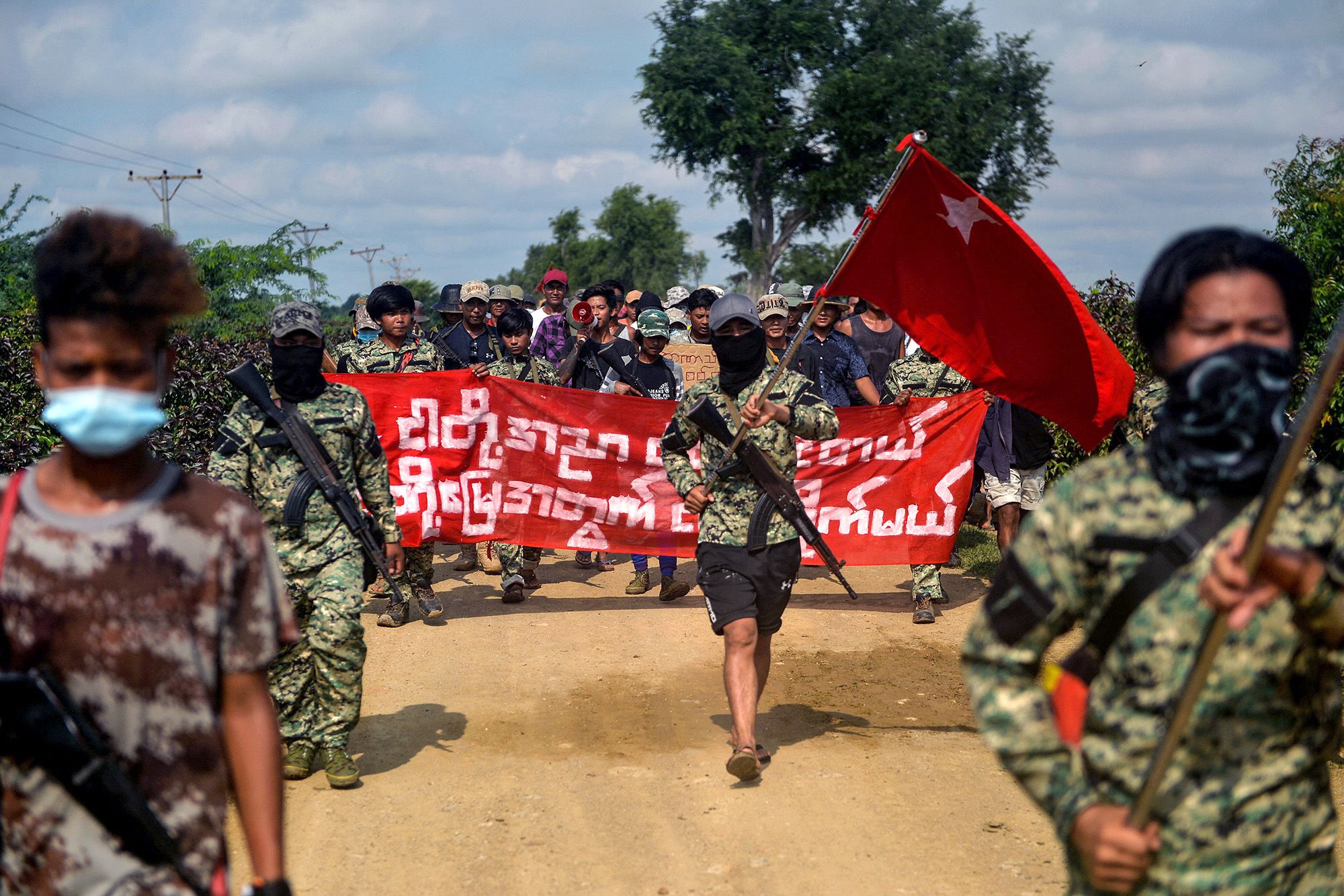“There’s no future for the youth.”
—Tun Myint, Professor of Political Science at Carleton College
VOA
In Myanmar, youth are forced to confront a deadly choice.
The country’s precarious position is under constant threat from rebel groups. Since the 2021 coup that replaced democratically elected leadership with a military junta, Myanmar has teetered on the edge of war. By February, it was facing significant losses in troop strength.
To replenish its troops, Myanmar’s military junta reactivated a then-dormant 2010 law for two-year military conscription in February. The country’s inhabitants are now locked in a frantic scramble: risk escaping to freedom, resign themselves to the enemy, or fight back—often by joining the very rebel groups against which the government seeks to fortify its army.
These rebel groups and the military junta are now embroiled in a bloody civil war. As a result, even those not under the military draft find themselves in a dangerous position, and conscription is only worsening the situation. Under the revived conscription law, the educated suffer the most; specialists, such as doctors, are required to serve for at least three years. They, along with students, are fleeing the country in droves.
“The people who are or about to become doctors, professors, engineers, and so on are now abandoning the country,” Tun Myint, Professor of Political Science at Carleton College, told VOA. “There’s no future for the youth.”
Doctors, specialists, and educated workers have a history of defying the country’s military junta long before the expanded military conscription laws. Despite the threat of violence and arrest, many doctors continued their work operating on resistance fighters and performing necessary surgeries. But for some, the conscription law may be the final straw. Myanmar’s health care sector is now on the brink of collapse.
For those who do manage to escape, the future may look grim. One man who trained as an engineer in Myanmar’s second-largest city, Mandalay, found himself selling household goods to escape to safety in Thailand. “We don’t have goals for our future or careers anymore,” he told Reuters. “We are just figuring out how to survive every day.”
Myanmar’s instability is widely impacting the careers and livelihoods of those who strive for a brighter future through education. However, more stable countries around the world have also begun to feel the effects of their conscription laws. Other countries that find themselves in a precarious situation—although perhaps not as urgent as Myanmar’s—have resorted to similar conscription tactics.
Research suggests, however, that military drafts are likely to hinder a country’s economic performance. Aside from inflated taxation and monetary issues from supporting a drafted army, a country with a required draft—whether it’s restricted to men or extended to all individuals of a certain age—risks disrupting each individual’s education and preparation for the workforce. Overall, numerous studies have concluded that military drafts reduce enrollment in higher education. In some cases, a draft restricted to male individuals still negatively impacts female enrollment.
In South Korea, a country still lauded as an economic powerhouse while facing an uncertain outlook for the future, all male citizens are required to serve in a two-year military draft to deter an attack from their enemies from the North. Many must choose when to complete their mandated military service, and plan around any aspirations for higher education. The effects disproportionately affect male citizens required to serve—so it’s no surprise that colleges in South Korea are disproportionately female. In 2023, 65.1% of undergraduates were women. In addition, compulsory military service in South Korea has been found to create a “long-lasting negative effect” on individual health, due to widespread exposure to smoking and alcohol from their time in service.
Meanwhile, in the midst of a war that many activists liken more to a one-sided genocide, Israel’s high court may be poised to severely disrupt the religious studies of ultra-Orthodox Jews by ending subsidies for educational institutions whose conscription-eligible students are exempted from the draft. The Israel Defense Forces currently require most Jewish men to serve almost three years, while Jewish women are required to serve two.
The head of the ultra-Orthodox Shas party, Aryeh Deri, referred to the court’s decision as “unprecedented bullying of Torah students in the Jewish state.”
Today, calls for a ceasefire in Israel are increasingly louder. Drafting men and women to a cause they do not believe in not only disrupts studies and prevents professional development; it is also a recipe for disaster.
The population of these countries, although some in much more precarious positions than the others, all face disruption of their personal and professional lives due to the military drafts. When drafts disproportionally target a certain group, they face barriers to career advancement and education. The future of the country’s specialized medical and technical sectors may give up citizenship or, in more unstable situations, flee in order to escape conscription.
As the grim realities of military conscription continue to cast a shadow over Myanmar and other nations, the urgent need for change becomes ever more apparent. The toll on Myanmar’s youth, especially those hoping to attain careers in professions like medicine and engineering, is devastating. With each passing day of conflict and forced conscription, the country’s future dims further.
Discussions on the implications of conscription have gained traction worldwide. Countries like South Korea and Israel are grappling with the societal costs of mandatory service. As countries grapple with the unavoidable reality of military drafts, urgent attention must be directed towards dismantling the barriers these drafts impose on education and the disruption to educated professionals.
Featured Image: Rebel fights escort protesters in a demonstration against the Myanmar military coup in Sagaing, Myanmar on September 7, 2022. © AFP/Getty Images






Comments are closed.